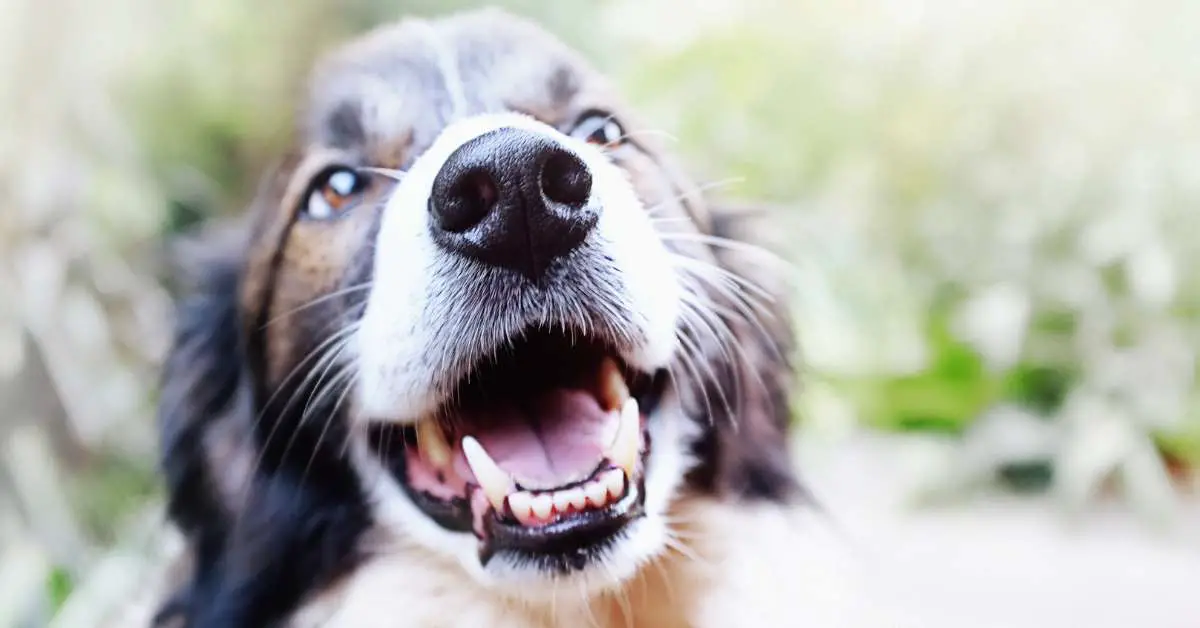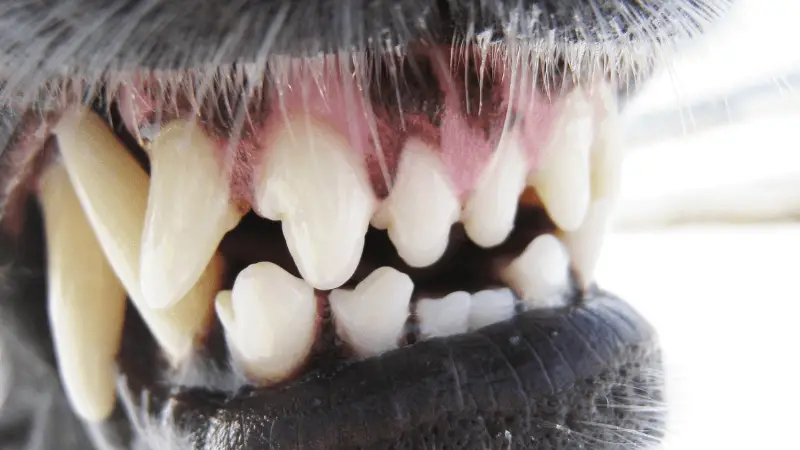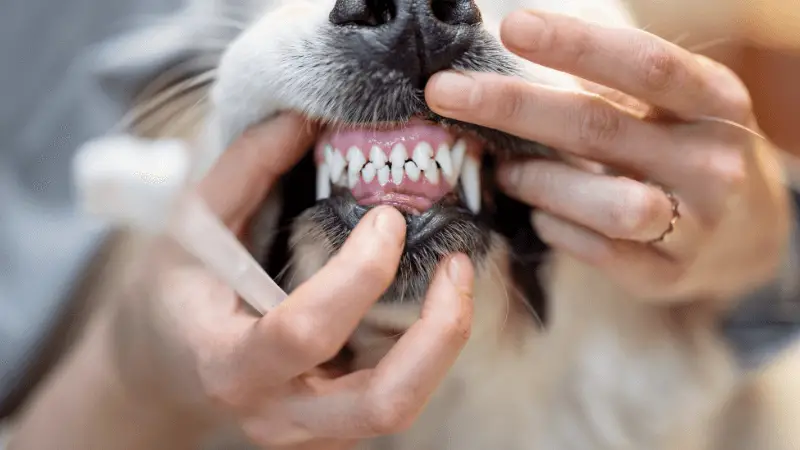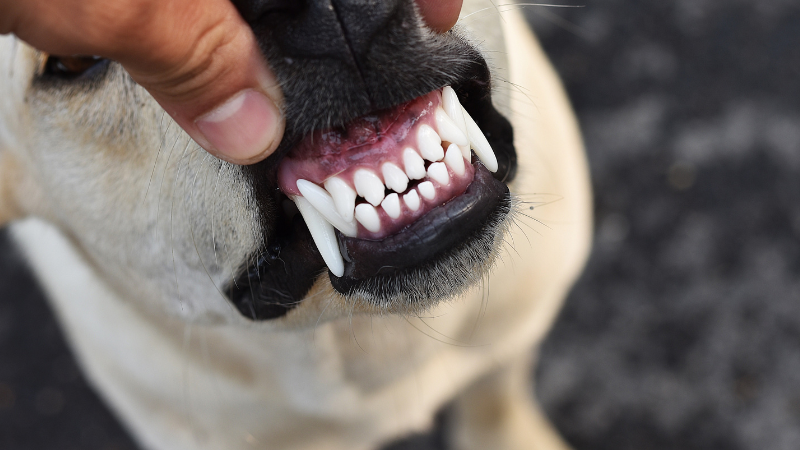Dog Teeth Chattering: What Is Behind This Strange Behavior?

If you’ve noticed your furry friend’s teeth making a chattering sound, you might be inclined to consult a veterinarian.
Dogs, just like us, are capable of experiencing a wide range of feelings and physical problems, resulting in behaviors that are not normal.
Let’s investigate the cause of dog teeth chattering and determine whether or not it should be a cause for concern.
Key Notes
1. Explore the reasons behind your dog’s teeth chattering and decode the signals they might be sending.
2. Understand when to seek professional help, the potential causes, and proactive steps to address this peculiar behavior in your furry companion.
3. Discover practical ways to provide warmth, comfort, and answers to frequently asked questions about your dog’s teeth chattering.

Should I Be Concerned About My Dog’s Teeth Chattering?
It is crucial to determine whether the chattering of your dog’s teeth is a cause for concern before jumping to any conclusions.
This behavior may be harmless and only transient in numerous cases. Nonetheless, being aware of the possible causes might assist you in making an informed choice about seeking veterinary assistance.
According to Dr Bonnie Beaver (DVM), “Teeth chattering behavior can be both spontaneous and intentional, and it can occasionally resemble the act of snapping at imaginary flies.”
6 Causes of Teeth Chattering in Dogs
1. Behavioral Reasons
The Dog is Excited
Dogs express themselves in various ways, and one of the main reasons for dog teeth chattering is excitement.
If your dog gets particularly thrilled during playtime or when anticipating a treat, the dog teeth chattering may just be a quirky manifestation of their enthusiasm.
The Dog is Cold
On the flip side, dogs can also chatter their teeth when feeling cold. Similar to humans shivering, dogs might use this mechanism (dog teeth chattering) to generate warmth and cope with lower temperatures.
2. Gastrointestinal Issues
Digestive problems could be a potential trigger for dog teeth chattering. This category encompasses a range of issues related to the digestive system.
When discomfort arises in the stomach or intestines, it may manifest as teeth chattering in your furry friend.
Upset Stomach
Issues such as indigestion, bloating, or gas can create discomfort in your dog’s stomach, prompting them to exhibit teeth grinding/chattering as a response to internal distress.
Intestinal Distress
Conditions affecting the intestines, such as inflammation or irregular bowel movements, may also contribute to chattering teeth.
Your dog’s body may be signalling discomfort in the gastrointestinal tract through this peculiar behavior.
3. They’re in Pain (Specifically Dental or Oral Pain)
The enigmatic phenomenon of chattering teeth in dogs often ties back to pain, particularly within the oral realm.
Like humans other animals, dogs can experience dental discomfort that manifests in this peculiar behavior.
Dental issues, ranging from cavities to gum disease, have the potential to induce a level of discomfort that prompts dogs to express their distress through dog chattering.
Dental Discomfort (Due to Any Dental Disease)
Dogs may suffer from dental problems, and the pain associated with conditions like cavities, periodontal disease or gum disease can be significant.
This discomfort becomes a catalyst for dog chattering, serving as a unique way for your dog to communicate their oral distress.

4. The Dog’s Mouth Hurts
Parallel to dental pain, general discomfort in your dog’s mouth can lead to dog’s teeth chatter. This discomfort might stem from various sources, including foreign objects lodged in the teeth or inflammation within the oral cavity.
Foreign Objects
Items stuck between the teeth or lodged in the mouth can cause irritation and discomfort, leading to dogs chatter as a response.
Regularly inspecting your dog’s oral cavity can help promptly identify and address these issues.
Oral Inflammation
Inflammation within the oral cavity, whether from infections or other sources, can contribute to a sense of unease including oral pain.
Dog chatters become a visible manifestation of your dog’s attempt to cope with the discomfort. Dog’s oral health must be kept in check all the time.
5. The Dog Has a Joint or Muscle Issue
Physical discomfort, especially related to joint or muscle problems, can play a role in the enigmatic world of teeth chattering.
In their inability to verbally communicate pain, dogs often resort to physical responses, and teeth chattering response can be one such indicator.
Joint Discomfort
Conditions affecting joints, such as arthritis or inflammation, may lead to teeth chattering. Observing your dog’s movements and behaviors can provide insights into potential joint issues.
Muscle Problems
Strained or injured muscles can also contribute to teeth chattering. This behavior becomes a visible expression of the discomfort your dog experiences in the musculoskeletal system.
6. The Dog Has a Neurological Disorder or is Having a Seizure
In rare but severe cases, teeth chattering in dogs may be linked to neurological disorders or seizures.
While less common, it’s crucial for pet and dog owners both to be aware of the possibility and to monitor their dogs for any unusual symptoms that may accompany this behavior.
Neurological Disorders
Certain neurological conditions can manifest in various ways, including teeth chattering. Identifying and addressing these disorders requires professional evaluation and intervention.
Seizures
Teeth chattering may be a manifestation of seizures in some dogs. If your dogs chatter their teeth alongside other signs indicative of seizures, it necessitates urgent veterinary attention.
According to Dr Theofanis Liatis (DVM, MRCVS) from Royal Veterinary College, London, “Bruxism or Teeth Chattering in awake dogs is a clinical sign of forebrain disease.”
When to Take Your Dog to the Vet for Teeth Chattering?
Determining the right time to call emergency vet or seek professional help for your dog’s teeth chattering is crucial to responsible pet ownership.
While occasional chattering may be harmless, persistent instances, accompanied by other concerning symptoms, or when the cause is uncertain, warrant prompt consultation with a veterinarian.
Persistence of Dog’s Chattering Teeth Behavior
If your dog’s teeth chattering becomes a recurring behavior, it may indicate an underlying issue that needs attention.
Persistent chattering suggests that there might be an ongoing problem, and consulting with a vet can help identify and address the root cause.
Accompanying Concerning Symptoms
Dogs teeth chatter, accompanied by other unusual behaviors, physical symptoms, or changes in your dog’s routine, could signal an underlying health problem.
Veterinarians are trained to interpret these signs comprehensively and can provide a thorough examination to understand the broader context.
Uncertainty About the Cause
When unsure about what might be causing your dog’s teeth to chatter, seeking professional advice is prudent.
Veterinarians possess the expertise to conduct diagnostics, perform examinations, and determine the specific factors contributing to this behavior.
How to Help Dogs with Teeth Chattering?
Providing comfort and warmth becomes a key strategy to address this peculiar behavior when your dog exhibits teeth chattering.
Creating a warm and comfortable environment for your furry friend helps alleviate immediate discomfort and contributes to their overall well-being.
Consider the following tips to ensure your dog feels cozy and content:
Ensure Adequate Shelter
During colder weather, ensure your dog has access to a warm and cozy indoor space. This can be a designated area with comfortable bedding, away from drafts, to provide a snug retreat.
Use Dog Blankets or Heated Beds
Consider investing in dog blankets or heated beds. These products offer additional warmth and comfort, giving your dog a cosy resting spot.
The added warmth can be especially beneficial in colder climates or chilly seasons.
Monitor Temperature Changes
Dogs are sensitive to temperature changes. Be vigilant about environmental shifts that could impact your own dog’s health and comfort.
Whether adjusting to colder nights or warmer days, ensuring your dog’s environment remains comfortable helps minimize the likelihood of teeth chattering.

FAQs
Why Does My Dog Chatter Their Teeth When Excited?
Excitement-induced teeth chattering is not uncommon. Dogs may express joy or anticipation in various ways, and this behavior could be one such manifestation (as discussed above).
Why Are My Male Dog’s Teeth Chattering After Smelling a Female?
This behavior might be linked to excitement or anticipation. Dogs can display various reactions when encountering scents associated with mating.
Why Does My Female Dog Chatter Their Teeth?
Female dogs may chatter their teeth for reasons similar to those of males, such as excitement or hormonal changes. If it becomes a persistent issue, consulting a vet is advisable.
Should I Always Take My Dog to a Vet if Their Teeth Chatter?
While occasional teeth chattering may not be alarming, persistent or loud noises accompanied by other symptoms warrants a vet visit.
Professional advice ensures timely detection of potential health issues.
Conclusion
Understanding why your dog’s teeth chattering is essential for responsible pet ownership. While some cases may be benign, others could signal underlying health issues.
You can ensure your canine companion’s well-being by staying observant, seeking professional advice when needed, and providing a warm and comforting environment.
Remember, a happy and healthy dog is one that can enjoy life to the fullest!
